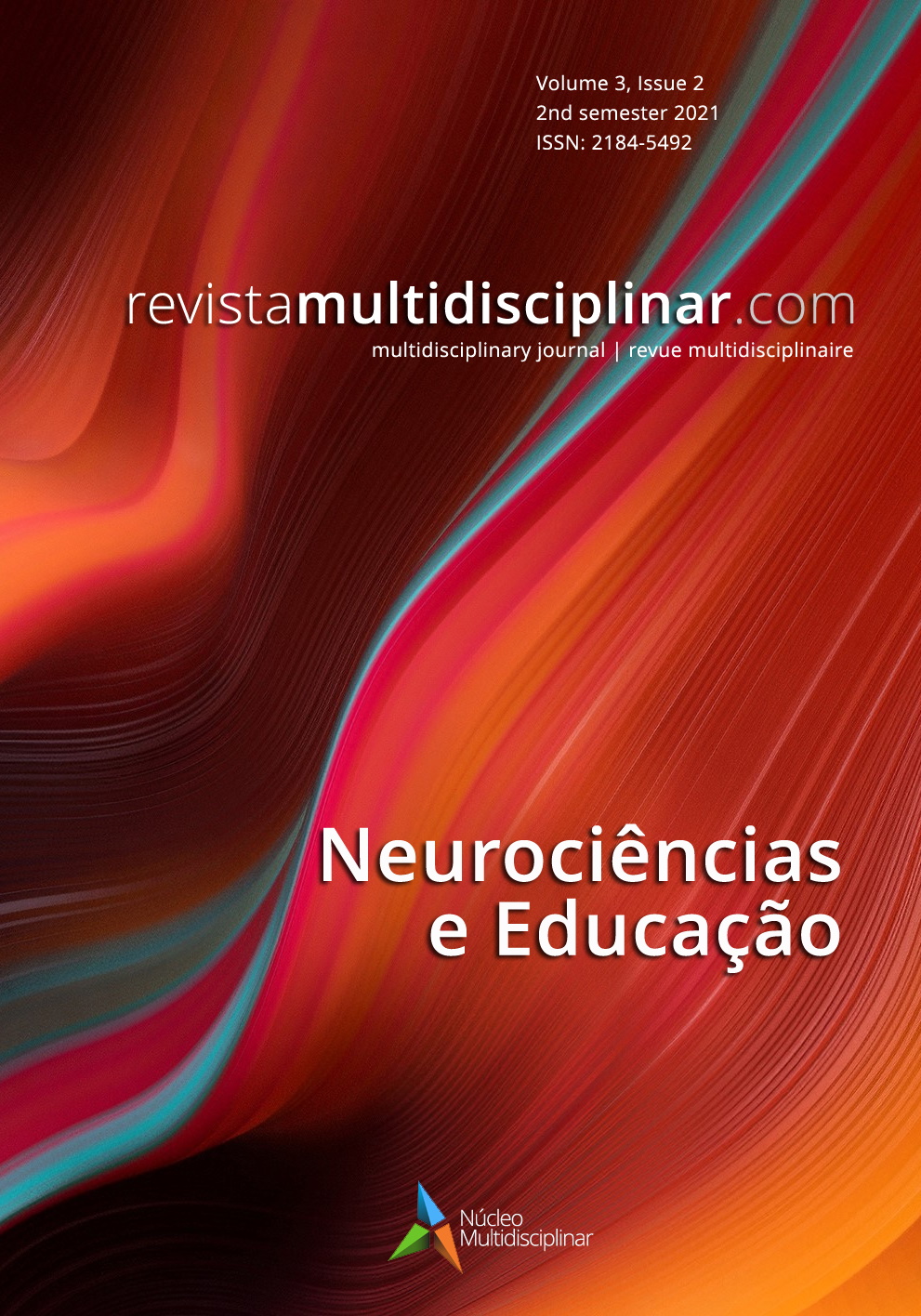Learning Styles Myth
What are the views of different professionals in the school context?
DOI:
https://doi.org/10.23882/NE2143Keywords:
learning styles, neuromyths on education, psychologists, speech-language pathologists, teachersAbstract
The learning styles theory is spread across the education field, despite previous research, especially from cognitive neuroscience, that concluded the lack of empirical support in its use in teaching. In this study, we used a survey to analyse the perception of learning styles in different professionals working in the Portuguese educational system. We recruited 136 participants, between the ages of 22 and 68 years (M=38,5 years; SD=10,51), 95% of them were female. The average of working experience it is 13.8 years (SD= 9.15). We analysed the answers of three groups of professional from different specializations, Teachers (n=42), Psychologists (n=44) and Speech-Language Pathologists (n=50) and no differences were found in their answers since all the groups scored above 80% as they classified as fact the benefits of teaching by learning styles. Our empirical data stand aligned with the scientific literature, suggesting that the learning styles myth is widely present in the school setting, affecting other professions beyond teachers. With this undistinguishable knowledge despite specialization, we discuss this bias's probable impact in the educational contexts.
References
Brod, G., & Breitwieser, J. (2019). Lighting the wick in the candle of learning: generating a prediction stimulates curiosity. NPJ Science of Learning, 4(17), 1-7. doi:10.1038/s41539-019-0056-y
Bruer, J. T. (1997). Education and the Brain: A bridge too far. Educational Researcher (26), 4-16.
Dekker, S., Lee, N. C., P., H.-J., & Jolles, J. (2012). Neuromyths in education: Prevalence and predictors of misconceptions among teachers. Frontiers in Psychology. doi:10.3389/fpsyg.2012.00429
Howard-Jones, P. A. (2014). Neuroscience and education: Myths and messages. Nature Reviews Neuroscience, 15(12), 817–824. doi:10.1038/nrn3817
Hughes, B., Sullivan, K. A., & Gilmore, L. (2020). Why do teachers believe educational neuromyths? Trends in Neuroscience and Education. doi:10.1016/j.tine.2020.100145
Kirschner, P. A. (2017). Stop propagating the learning styles myth. Computers & Education, 106, 166-171. doi:10.1016/j.compedu.2016.12.006
McMahon, K., Yeh, C. S., & Etchells, P. J. (2019). The Impact of a Modified Initial Teacher Education on Challenging Trainees' Understanding of Neuromyths. Mind, Brain, and Education, 13(4), 1-10. doi:10.1111/mbe.12219
Metcalfe, J., & Kornell, N. (2007). Principles of cognitive science in education: the effects of generation, errors, and feedback. Psychonomic Bulletins & Review, 225-229.
OECD. (2002). Understanding the Brain: Towards a New Learning Science. Paris: OECD. Paris: Organisation for Economic Co-operation and Development.
Pashler, H., McDaniel, M., Rohrer, D., & Bjork, R. (2009). Learning Styles - Concepts and Evidence. Psychological Science in the Public Interest, 9(3), 105-119. doi:10.1111/j.1539-6053.2009.01038.x
Pastou-Papadatou, Marietta, Gritzali, M., & Barrable, A. (2018). The Learning Styles Educational Neuromyth: Lack of Agreement Between Teachers's Judgements, Self-Assessment, and Students's Intelligence. Frontiers in Education, 3(105). doi:10.3389/feduc.2018.00105
Rato, J. R. (2014). Mente, Cérebro e Educação: Um campo transdisciplinar em expansão. Povos e Culturas (18), 39-46.
Rato, J. R., Abreu, A. M., & Castro-Caldas, A. (2011). Achieving a successful relationship between neuroscience and education: the views of portuguese teachers. Procedia - Social and Behavioral Sciences (29), 879-884.
Rato, J. R., Abreu, A. M., & Castro-Caldas, A. (2013). Neuromyths in education: what is fact and what is fiction for Portuguese teachers? Educational Research, 55(4), 441-453.
Rato, J., & Castro-Caldas, A. (2010). Neurociências e educação: Realidade ou ficção? In C. Nogueira, I. Silva, L. Lima, A. T. Almeida, R. Cabecinhas, R. Gomes, C. Machado, A. Maia, A. Sampaio & M. C. Taveira (Eds.), Actas do VII Simpósio Nacional de Investigação em Psicologia. Universidade do Minho: Portugal.
Rato, J., Rocha, M., Amorim, J., Abreu, A.M., Strauss, S., & Castro Caldas, A. (abstract accepted 2021). Neuromyths in education: Do Psychologists and Speech-Language Pathologists share Teachers’ beliefs? Frontiers in Education.
Reber, T. P., & Rothen, N. (2018). Educational App-Development needs to be informed by the Cognitive Neurosciences of Learning & Memory. NPJ Science of Learning, 3(22), 1-2. doi:10.1038/s41539-018-0039-4
Rogowsky, B. A., Calhoun, B. M., & Tallal, P. (2020). Providing Instruction Based on Student's Learning Style Preferences Does Not Improve Learning. Frontiers in Psychology. doi:10.3389/fpsyg.2020.00164
Schregel, S., & Broer, T. (2020). Introduction: Contested narratives of the mind and the brain: Neuro/psychological knowledge in popular debates and everyday life. History of the Human Sciences, 33(5), 3-11. doi:10.1177/0952695120972915
Tardif, E., Doudin, P.-A., & Meylan, N. (2015). Neuromyths Among Teachers and Student Teachers. Mind, Brain, and Education, 9(1), 50-59. doi:10.1111/mbe.12070
Thomas, M. S., Ansari, D., & Knowland, V. C. (2019). Annual Research Review: Educational neuroscience. Journal of Child Psychology and Psychiatry and Allied Disciplines, 60(4), 477-492. doi:10.1111/jcpp.12973
van Kesteren, M. T., & Meeter, M. (2020). How to optimize knowledge construction in the brain. NPJ Science of Learning, 5(5), 1-7. doi:10.1038/s41539-020-0064-y
Willingham, D. T., Hughes, E. M., & Dobolyi, D. G. (2015). The Scientific Status of Learning Styles Theories. Teaching of Psychology, 42(3), 266-271. doi:10.1177/0098628315589505
Downloads
Published
How to Cite
Issue
Section
License
Copyright (c) 2021 Jorge Amorim, Joana Rodrigues Rato

This work is licensed under a Creative Commons Attribution-NonCommercial 4.0 International License.









